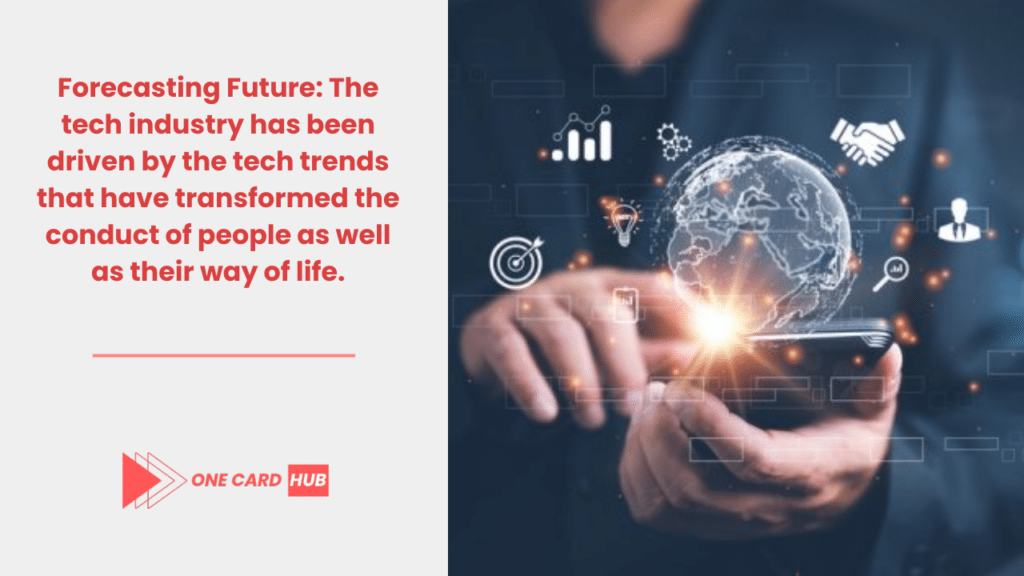
Forecasting Future: The tech industry has been driven by the tech trends that have transformed the conduct of people as well as their way of life.

In the age of fragility, where future becomes perplexing and athletic, envisioning the future is at the same time gratifying and challenging. Watching the dawn of a new times, and yet being clueless of which trends will define the technology industry in the immediate future, means that it is incumbent upon us to make the distinction between the patterns. From artificial intelligence to quantum computing, here's a glimpse into what the future holds:From artificial intelligence to quantum computing, here's a glimpse into what the future holds:
Artificial Intelligence (AI) Revolution
The advance of AI has far already reached all fields, healthcare to finances. In the foreseeable future AI is not expected to stay at the current level of sophistication but instead it will evolve further with machine learning algorithms and natural language processing becoming increasingly more advanced. By that, corporations will become completely different things, adjusting wisely while also exploring digging deeper.
Quantum Computing Breakthroughs
Quantum computing introduces an untold new degree of computing ability that solves complex problems instead of previously unachievable computing, now reached. Yet it is still in its infancy, investigators soon advance in their accomplishments, and in the future we expect major discoveries that can change the encryption, drug search and materials science radically.
IoT IoT is the use of the Internet in everyday life. It opens up the way for sharing information to a great extent.
The scope of the IoT network will widen rendering more things connected and performing communication in a hassle-free manner among them. This interlaced network will place smart cities, healthcare, and transportation at the forefront of smart innovation, which will facilitate sustainability and bring about new quality of life.
Cybersecurity Evolution
Along with the growth of the connected devices and the expansion in digital spaces, cybersecurity is going to become even a more critical issue. Advances in AI-related cybersecurity programs, blockchain based authentication systems and decentralized infrastructures against the growing cyber threats should be expected.
Renewable Energy Integration
Reconsidering the necessity of renewable energy into the global energy mix is crucial as climate change remains a critical issue. The fast technological advances like smart grids, energy storages and advanced analytics are the main factors that stress the interconnection between supply and demand in the sector of renewable energy and encourage the transition towards a green energy future.
The use of AR and VR is rapidly expanding and it is something that should be the main focus of the educational sector.
The horizon for these technologies extends beyond entertainment and will be found used in educational platform, healthcare, and remote work. Enhanced immersive experiences will change the rules of the game, and mankind won't stay untouched, since the virtual world will feel real too.
Everyday Decisions of Ethical and Responsible Nature in Technical practice
As technology patchworks the society now, the ethics of using technology in a responsible way will become the most important value. This will include data privacy rules to algorithmic transparency, all stakeholders will look for tech firms to account records properly and transparently.
Edge Computing Advancements
With edge computing, data processing will witness an evolution where the requisite computation and storage of huge chunks of data will occur closer to where the data is generated. The control latency will also be reduced and the reliability of the systems will be enhanced. This trend will allow for data processing applications, from driverless vehicles to automated manufacturing factories.
5G Connectivity Revolution
The deployment of 5G networks will bring forward an amazing time of connection that never been seen before with its super-fast, low-latency and widest connection in the world. This, in turn, will open doors for breakthroughs like self-driving cars, long-distance surgery supported by networks, and virtual reality thrive without the restraints of a slow or unreliable network.
Biotechnology Breakthroughs
Technological and biological development will lead to incredible breakthroughs in medicine, agronomy, and the conservation of the natural habitat. Genetic engineering techniques like CRISPR as well as synthetic biology and personalized medicines are the innovations of biotechnology that will bring a new face of health care and will answer global challenges.
Circular Economy Solutions
Resource depletion and soaring environmental degradation have always been problems facing the tech industry, hence adherence to the circular economy principles will continue to grow more and more appealing. Tech companies will give the greenlight to product lifecycle management; waste reduction initiatives and even recycling programmes in the course of their operations and product innovations.
Democratization of Tech Skills
Achieving tech literacy with the use of technology and information will be more democratic, thus, allowing people from the lowest economic background to participate in and improve online business. Online learning platforms, coding bootcamps, and community efforts will help alleviate skills gap and enable the appearance of a more diverse technology industry in the future as well.
Human-Machine Collaboration
Automation and AI articles will enter the market in the coming years; hence, time for the focus shift to humans-machine collaboration where machine serve human instead of replacing them will be here. It will also be the main common feature of the jobs of the future as this relationship will result in new job roles, improved productivity, and higher creativity across a number of industries.
Quantum Internet Development
In-depth quantum computing inventions make it possible for the researchers to try to develop a quantum internet which is based on quantum entanglement that would provide secure data networks. This can turn the field of communication, cryptography, and information exchange upside down, resulting in changes from highly secure and more efficient networking.
Bioinformatics Advancements
The interface of biology and computing, known as bioinformatics, will contribute the new findings and help us to find the solution. Combining with big data analytics, machine learning, and genomics, researchers will excavate the intricate life processes that will accelerate discoveries for new drugs, personalized medicine, and improvements in agriculture.
Digital Health Revolution
The digital health sector will send a huge upsurge meeting the result of the merge of the technologies and the healthcare sector. The introduction of telemedicine and health monitoring devices that are worn and apps that are run by an individual will enable people to get a better grip on their health, thus transforming health care and illness management.
Decentralized Finance (DeFi)
Decentralized finance (DeFi) networks leveraging blockchain infrastructure will help to equalize the opportunities in the financial market, eliminating the involvement of intermediaries and making peer-to-peer transactions a possibility. The fields of decentralized lending and borrowing to automated trading and asset management are changing because of the cryptocurrency which is a DeFi application, and this in turn will lead to the financial inclusion, globally speaking.
Spatial Computing
Spatial computing, a concept that involves augmented reality (AR), virtual reality, and computer vision, makes the physical world digital by bringing immersive gaming and other forms of experience to real settings. As for the case of a user's experience in interactive retail environments, virtual design collaboration, or spatial data visualization, this technology will be completely revolutionizing the way we do communicate with the surroundings.
Quantum-Safe Cryptography
With the advent of a quantum computing the current traditional cryptographic algorithms are fail-safe. Socially Quantum-safe cryptography (QSC) which uses QSC encryption technique will be a key factor for Achieve the security of the data and communication and ensure secure their communication in the quantum era.
Resilient Supply Chains
The pandemic hurricane was the worst that the world has ever seen it and it is now more visible than ever that supply chains need agility. Blockchain, IoT, and Artificial Intelligence capability will gather real time, traceable data and adopt predictive pattern which will build resilience and agility in Supply Chains exposed to future disruptions.
Digital Twins
Digital twin concept which stands for virtual replica of physical assets or systems will be the cornerstone of product design processes, production ways and maintenance crew. Through simulation of real-life situations and optimization of performance in the virtual environment; digital twins will be the way for industries to develop efficiency, to make cost effective decisions and to upkeep decision-making.
Edge AI Integration
The merging of Edge computing and Artificial Intelligence will allow on-the-spot data processing and analytics along the network edge. This integration is at the base of the applications of autonomous vehicles, smart infrastructure, and industrial automation, where low latency and high reliability is a must-have for the smooth workflow.
Regulatory regime to address emerging technologies.
With the ever-increasing technological advancements which have an effect of disrupting the traditional industry while at the same time raise ethical questions, there is need for governments to collaborate with regulatory bodies in formulating policy to favor fair and wide use of technology. This, for instance, can be done through data privacy regulations, step-by-step algorithms, and ethical AI use, which will control the boundaries of innovation being ethically and legally permitted.
Space Exploration and Commercialization
Space innovation and the business sector will spearhead space exploitation for economic purposes through groundbreaking technological advancements which will turn to space commercialization and space adventuring. From low-Earth constellations to space tourism and asteroid mining, the private sector will explore the entire space as a new frontier of development, not only the domain of government-funded missions, thereby opening up the fields of innovative education and economic growth.
Mind-Machine Interfaces
Neuro-techs and brain-machine interface will be applied to improve the cognitive capabilities and transcend traditional human boundaries into machines. These frameworks would facilitate direct conversations between the brain and external gadgets which will be the first step leading to a breakthrough in healthcare, gaming and helping the individuals with disabilities.
Autonomous Everything
The phasing of independent operation will go beyond the line of cars to include drones, robots, and smart appliances. Automated systems such as sensors, AI algorithms, interconnected data channels will be the underlying technology that will simplify production processes, term productivity, and make the transition in agriculture and manufacturing industries possible.
Social Impact Tech
The advancement of technology by these tech startups and their initiatives will be at the centre of social and environmental problem solving which will be done via technological solutions. When a social impact tech group develops renewable energy projects or health education apps for underprivileged people, it applies the uniqueness and ingenuity of technology to evoke positive impacts
and sustainable development globally.
Quantum-Supremacy Demonstrations
Quantum experiment achievements will become more and more advanced, relying on unique abilities inherent to quantum computers to solve complex problems better than classical machines. These demonstrations will not only link the power of quantum computing but also force a research and investment in these types of new technologies.
What we encounter today are rather the entanglements and advantages that have risen concerning such emerging trends, and thus it becomes crucial to put emphasis on partnership, openness, ethical business. Through the harnessing of the potential of technology and responsibility we will be in possession of a future whose advancement technologically may be immeasurable but which we may be proud of because of the equality, sustainability and enrichment it will have offered to all.
What we encounter today are rather the entanglements and advantages that have risen concerning such emerging trends, and thus it becomes crucial to put emphasis on partnership, openness, ethical business. Through the harnessing of the potential of technology and responsibility we will be in possession of a future whose advancement technologically may be immeasurable but which we may be proud of because of the equality, sustainability and enrichment it will have offered to all.
FAQs: FAQs about Emerging Trends That Are Influencing The Digitalization (Tech Sector).
1. Which of the most recent developments in the tech-sphere are going to influence our future as digital human beings?
• Trends that are gaining ‘fame are recent events and designs which can change the face of technology into the future. They commonly symbolize creations of novel breakthrough devices or drastic changes towards new technologies, practices or forms of business ventures.
2. Why should we care about and watch out for the trending topics?
• The way the industry moves constantly fast its leaders is to cover new trends happening and exploiting the arising opportunities. This is a factor that permits companies and their employees to adapt their strategies so as to stay on top of the changes and remain interwoven in the dynamic environment.
3. My question would be not only how can I identify but also which emerging trends in the tech landscape, if any.
• Analyzing market trends, reviewing industry specific magazines, attending conferences and workshops and networking with other industry players are some of the ways to determine the emerging hubs. Concurrently, a review and analysis of VC funding from major corporations and creative startups can also be an apt indication of where the technology is heading.
4. To start, which are the exciting developments on the horizon?
• These emerging trends are viewed as the most promising ones like the advanced artificial intelligence, quantum computing, IoT, cybersecurity, renewable energy, interactive AR and high-performance VR technologies and the democratization of basic tech skills, among other things.
5. How can I get ready for the challenges and weakness arising due to the evolving situation in the market and take advantage of the opportunities it gives me?
• For the sake of being on the launch to seize opportunities emerging trends, it necessary to continue to study and keep abreast with new tech and more practices. This could include a variety of activities, such as, taking training classes, obtaining relevant certifications, trying the latest tools and technologies, and also network or build with other people in the same line of work.
6. What are the difficulties related to using the technologies present in the context of a 'new' landscape?
• The problem with adopting the new trends is that you must invest a great deal in research and development. Another hindering factor is that security and privacy is not guaranteed. Policymakers and cultural values may hinder the process of the adoption also. Finally, the rate in which emerging technologies become obsolete makes it difficult to undergo the adoption of the new trends.
7. How do I be sure that my company will not get behind the emerging trends and stay in the flow and meet the new tendencies?
• To be successful in responding to ever-changing trends, companies need to cultivate a culture of innovation and adaptability, support research and development flagship, keep track of the newest trends on the market and create strategic alliances with various firms and research institutions.
8. What are the principal ethical issues that should be taken into account while using emerging players in the technology creation?
• The vital ethics parts of the topic include making sure of the data privacy security, while using artificial intelligence responsibly, reducing algorithmic bias, ensuring all people are having fair access to technology, and taking into account the social and environmental impact of technological innovations. Therefore company and industry participants have to respond to the problems when their technologies are being developed and implemented.
• Trends that are gaining ‘fame are recent events and designs which can change the face of technology into the future. They commonly symbolize creations of novel breakthrough devices or drastic changes towards new technologies, practices or forms of business ventures.
2. Why should we care about and watch out for the trending topics?
• The way the industry moves constantly fast its leaders is to cover new trends happening and exploiting the arising opportunities. This is a factor that permits companies and their employees to adapt their strategies so as to stay on top of the changes and remain interwoven in the dynamic environment.
3. My question would be not only how can I identify but also which emerging trends in the tech landscape, if any.
• Analyzing market trends, reviewing industry specific magazines, attending conferences and workshops and networking with other industry players are some of the ways to determine the emerging hubs. Concurrently, a review and analysis of VC funding from major corporations and creative startups can also be an apt indication of where the technology is heading.
4. To start, which are the exciting developments on the horizon?
• These emerging trends are viewed as the most promising ones like the advanced artificial intelligence, quantum computing, IoT, cybersecurity, renewable energy, interactive AR and high-performance VR technologies and the democratization of basic tech skills, among other things.
5. How can I get ready for the challenges and weakness arising due to the evolving situation in the market and take advantage of the opportunities it gives me?
• For the sake of being on the launch to seize opportunities emerging trends, it necessary to continue to study and keep abreast with new tech and more practices. This could include a variety of activities, such as, taking training classes, obtaining relevant certifications, trying the latest tools and technologies, and also network or build with other people in the same line of work.
6. What are the difficulties related to using the technologies present in the context of a 'new' landscape?
• The problem with adopting the new trends is that you must invest a great deal in research and development. Another hindering factor is that security and privacy is not guaranteed. Policymakers and cultural values may hinder the process of the adoption also. Finally, the rate in which emerging technologies become obsolete makes it difficult to undergo the adoption of the new trends.
7. How do I be sure that my company will not get behind the emerging trends and stay in the flow and meet the new tendencies?
• To be successful in responding to ever-changing trends, companies need to cultivate a culture of innovation and adaptability, support research and development flagship, keep track of the newest trends on the market and create strategic alliances with various firms and research institutions.
8. What are the principal ethical issues that should be taken into account while using emerging players in the technology creation?
• The vital ethics parts of the topic include making sure of the data privacy security, while using artificial intelligence responsibly, reducing algorithmic bias, ensuring all people are having fair access to technology, and taking into account the social and environmental impact of technological innovations. Therefore company and industry participants have to respond to the problems when their technologies are being developed and implemented.






Related posts